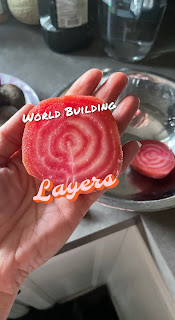Worldbuilding has the power to captivate a reader. To transport them from their everyday life to somewhere surprising and unique. It’s why I love reading and writing fantasy, because the worlds are rich, enticing, and dramatic, intriguing, brutal, and romantic. And for me, when it comes to worldbuilding, it’s both the big picture and the little details that count.
Here are five worldbuilding tips I’ve picked up along the way:
- Take inspiration from everywhere, everything, and everyone. Absolutely, read in your genre, that’s a given, but also watch and listen to media outside your usual sphere of influence. Podcasts, documentaries, history programs, mythology, fairy tales, the news … be a sponge, and seek out things that will force you to see the world from a different perspective. Check out science YouTube (or in my case, find someone else who has, and pick their brain!), watch people you do and don’t know, and notice what drives them and how they interact. Anything can spark an idea to enrich your world, from quantum computing, to crypto currencies, to the social hierarchies of indigenous tribes in the Amazon. Walk, watch films, look out the window on car journeys, listen to music, and don’t forget to write things down!
- In Lean Management, there’s a concept call The Five Whys, and it works well for worldbuilding too. The basic method is to ask why five times, and within five whys, you’ve probably got to the root cause of why something is the way it is. Why does your world trade in the way it does? Why do they use certain materials? Why are the roads paved with gold? If you don't know why (at least roughly speaking), you might have holes in your world, or it might even be blocking you. You don't need to have EVERYTHING mapped out, but you do need to know the bones of how things work and play together: politics, infrastructure, magic, religion, education, employment, the economy, healthcare … you get the drift.
- I had an amazing sociology teacher who told my class that the quest for power, wealth, and status drives a huge amount of human behavior (along with reproduction, of course). Think about how people get each of these things in your world. Is there something unique about how power, wealth, or status is derived? Who has these things now, and how do they pass from one person to another? Understanding that will help with character motivations too (especially for the bad guys).
- Pay attention to the details, and remember consistency is key. Keep a wiki or spreadsheet to help you keep track (or a big piece of paper with all the important information. If low tech works best for you, it works best for you). Draw diagrams and maps, and experiment with what helps you most, along with what best sparks your creativity. To make sure the details work across your world, ask yourself questions from the perspective of all. You might be writing about the nobles, but does it make sense for a peasant, or a merchant, or a teacher, or a medic? Or better yet, have someone else ask you. Conversations often flush out holes.
- Be playful, explore, be curious, and be open to “failure”. Worldbuilding should be fun, and nobody can limit your imagination. If you find yourself down a rabbit hole that doesn’t pan out, so what? You probably had a wild time exploring in your mind. Not every idea has to yield fruit, but push yourself to go further, think bigger, and be bolder, knowing that some ideas will “fail”. That’s fine. It’s part of the process. And a failure might spark an even better idea. But keep going, for a lush, alluring world will be your reward.
















